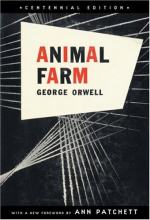|
|
Animal Farm Topic Tracking: Greed
Greed 1: Old Major describes all the evils the humans force on the animals as due to greed. He warns the animals that humans act only in their own interests and will steal everything the animals produce. Jones callously slaughters the animals when they have become useless.
Greed 2: Although the animals assume that the apples will be shared out equally, the pigs take all the apples and milk for themselves. The pigs do not acknowledge that they are being greedy, but say that they are taking the apples and milk for the good of the other animals, because it is important that they remain in good health to manage the farm.
Greed 3: Mollie is too lazy to do her share of the work, even though the other animals are supporting her and giving her an equal share of food. Because Mollie wants her sugar and ribbons, even though they are not allowed on the farm, she decides to run away from Animal Farm. She abandons the other animals and finds a new owner who will give her what she wants.
Greed 4: Napoleon isn't satisfied with the fact that the pigs, of whom he is a leader, now run the farm. He wants more power, he wants personal power, and he doesn't want to share his power with Snowball - so he develops a scheme to run Snowball off the farm.
Greed 5: The pigs are not satisfied with living in their sty, but move into the farmhouse. They take their meals in the kitchen, use the drawing-room as a recreation room and sleep in the beds. They also start getting up an hour later than the other animals do.
Greed 6: Napoleon is still hungry for more power and more status. He issues all his orders through Squealer or one of the other pigs, and avoids going out in public more often than once every two weeks. When he does appear he is attended by his dogs and a black cockerel. In the farmhouse he moves into separate apartments from the others, takes his meals alone with two dogs waiting on him, and eats from the special Crown Derby china dinner service. The gun is now fired on his birthday as well as the other two anniversaries every year. The pigs make up titles for him like 'Father of All Animals', 'Terror of Mankind' and 'Protector of the Sheep-fold.'
Greed 7: Napoleon refuses to take a check for the timber, and demands to be paid in cash. He then holds a special meeting to display the bank-notes - he lies on a bed of straw on the platform, wearing both the military decorations he has awarded himself, with the money next to him piled on a china dish from the farmhouse kitchen. The animals are allowed to file past one by one and look at the money for as long as they want to.
This backfires on Napoleon - it turns out that the notes were forged and Frederick got the timber for nothing.
Greed 8: Napoleon buys sugar for himself, but doesn't allow the other pigs to eat it.
He fathers thirty-one piglets, impregnating all four of the sows on the farm at about the same time.
The pigs are hungry for yet more status - they make a rule that if a pig and another animal meet on a path, the other animal must stand aside. They also make a rule that all pigs, of whatever degree, will be allowed to wear a green ribbon on their tail on Sundays as a mark of privilege.
Greed 9: The pigs cook up the barley and instead of using it to feed the hungry animals, use it to brew beer. They give each pig an allowance of a pint of beer a day, with half a gallon for Napoleon, which is served to him in the Crown Derby soup tureen.
Greed 10: The pigs sell Boxer to the knacker to be slaughtered, because he is past work - even though, with proper care, he could have been expected to live another three years. They want the money to buy themselves whisky.
Greed 11: After many years, Napoleon becomes a mature boar weighing twenty-four stone, while Squealer becomes so fat that it is difficult for him to see out of his eyes.
Greed 12: Clearly, the human farmers are just as keen to make a profit and care as little about their animals as the pigs do. The humans compliment the pigs on their methods.




